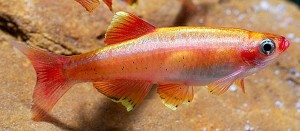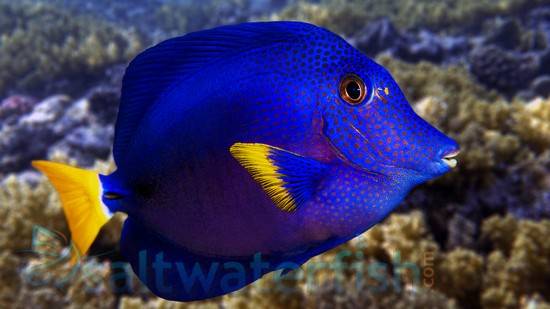The Golden White Cloud (Tanichthys albonubes) is a color variant of the White Cloud Mountain Minnow which originates from the “White Cloud Mountain” (Mount Baiyun) in Kwangtung, China. The Golden White Cloud is also commonly referred to by tropical fish keeping enthusiasts as the Meteor Minnow, Chinese Danio, and “poor mans Neon Tetra“.
Because of pollution and over collection, the Golden White Cloud is practically extinct in its native habitat. They are now commercially bred in farms and are readily available to tropical fish keeping enthusiasts. Unfortunately, inbreeding has led to a genetically weak stock that makes the fish vulnerable to disease and physical deformities.
Golden White Clouds are a peaceful, active, shoaling species that adapts well to less than perfect water conditions. This makes them a perfect candidate for beginning tropical fish keeping enthusiasts.
The Golden White Cloud has a gold body with red markings on each side of the head and towards the tail. The males generally have brighter colors and slimmer bodies, with wide, fan shaped dorsal and anal fins.
The fins of the females are triangular and more wedge shaped.
When housed in a tank of 8 or 10 of their own kind, Golden White Clouds are peaceful, colorful and very active; but when kept alone or in smaller pods, the fish tend to lose their colors, chase and pick on other tank inhabitants. They do well in community aquariums with other peaceful fish like small Danios, Devario, Garra and many loaches.
Because they originate from the gorges of the White Cloud Mountains, an ideal environment for them would be a stream style tank setup. Slow moving water, with a densely planted substrate of sand, pebbles, leaf litter, and possibly some driftwood will mimic their natural environment.
White Clouds of every color variant are easily bred in an aquarium environment. They are egg scatterers that will drop their eggs freely amongst the vegetation in the tank. Condition them with regular feedings of live brine shrimp and daphnia to select the most colorful fish for breeding. Lower the tank water temperature to about 68°F, give them a spawning mop or some Java Moss, and they will start breeding in short order. Male Golden White Clouds will display their fins alongside the female when attempting to entice her to lay her eggs. After the eggs have been fertilized and scattered around the plants, hatching usually takes place in 36 to 60 hours. The fry are tiny but can be seen clinging to the sides of the tank glass and among the plants. They can be fed powdered fish food or infusoria. After a few days they can be fed baby brine shrimp
or daphnia.
Although Golden White Clouds will not usually cannibalize their fry, many tropical fish keeping enthusiasts do not allow the parents to remain in the breeding tank after the eggs have been scattered.
In the wild, Golden White Clouds are micro predators that feed on small insects, worms, crustaceans, and other zooplankton. In an aquarium environment, they can be fed a vegetable based flake food with occasional offerings of freeze dried bloodworms or tubifex.
Farm raised Golden White Clouds are usually available for purchase when they reach 3/4″ to 1-1/4″ in length.
Minimum Tank Size: 10 gallons
Care Level: Easy
Temperament: Peaceful
Aquarium Hardiness: Hardy
Water Conditions: 64-79° F, KH 10-15, pH 6.5-8.0
Max. Size: 2″
Color Form: Gold, Yellow
Diet: Omnivore
Origin: China; Farm Raised in Singapore
Family: Cyprinidae
Lifespan: 5 years plus
Aquarist Experience Level: Beginner




